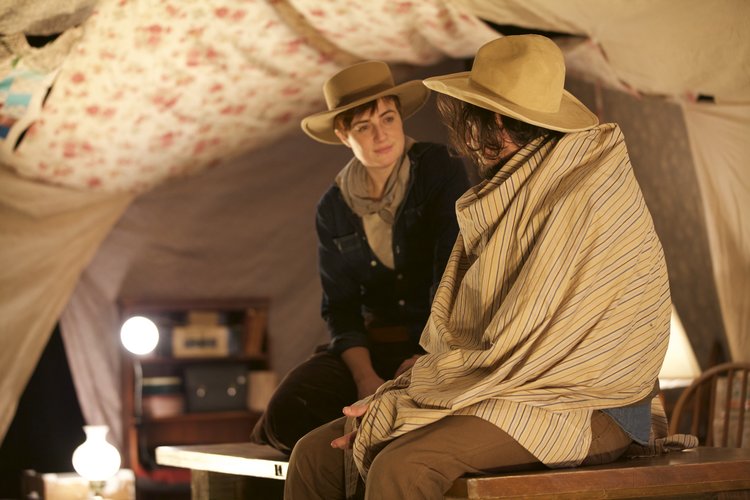Composed somewhat in the postmodern tradition of the Wooster Group et al, this piece doesn’t follow a clear linear narrative but presents a collage of related fragments in a mixture of styles. It is lent overall coherence by the unifying theme of a troubled sibling relationship, and the strong visual, auditory and choreographic elements, all of which are well considered and executed.
The piece takes place in a large hall, with the stage space scattered with wooden furniture; a table, cases, a stepladder and a trunk, the unified visual design of beige, tan and cream colours evoking 1950s rural America. It begins with co-creator and performer Annie Saunders ‘as herself’ introducing herself as Antigone, or Annie for short. The rest of the piece deals in large part with her relationship with her brother, here played by Max Hersey. The parallel with the Greek myth is that Annie, too, seems to suffer through her dedication and self-sacrifice towards her brother. Her concerns seem to stem mainly from his forays into criminality, in particular as a marijuana farmer in California. This element leads to the second thematic thread of the piece: the legal ambiguities, corruption and comparative lawlessness of the still-Wild West.
Sections of the piece are presented as live recreations of recorded phone conversations between Annie and her brother, delivered with the performers wearing headphones. As is the case with the production throughout, the design and composition of this section is finely crafted, with a telephone audio effect appearing and disappearing seamlessly as the performers switch between addressing the audience and resuming the conversation. There is a layered and sophisticated soundscape running throughout, sometimes featuring snippets from Western movies, sometimes delivering a barely perceptible, ominous drone to underscore the action with a troubling tone. And there are small inventive touches, like the wonderful moment when a swallowed coin creates the sound of galloping horses.
There are sections of stylised physical choreography, skilfully performed to dramatise the relationship of care and resentment between the two, and a sequence of impeccably timed miming to each other’s voices. A large patchwork of sheets and blankets is raised to form the screen for a shadow sequence in which the pair as children appear to play out a cowboy scene. Later this is hoisted via ropes and pulleys to completely cover the audience, bringing us within the den of the play-acting. This is such a large-scale shift in the staging that I expected some major change to the piece, such as audience involvement, but this did not happen.
Instead, the piece continues with this collage of recollections, delivered through different registers, sometimes stylised and ambiguous, and then suddenly direct and informative. We learn that both their parents came to work as criminal defence lawyers, and then (quite late on) that Annie spent two years in a psychiatric institution as a teenager. This seemed quite an important point that might have been useful earlier. There may be perceived a hint of self-indulgence in basing a piece on conversations with a troubled brother – especially when casting oneself as a victim – but when we learn the relationship had such a crucial and devastating effect on her life, the source material seems more poignant and pressing. As her concern for her brother transforms into anger, we see her resentment at the obligation she feels towards him. Even though he apparently isn’t asking for her help, she cannot help but be hurt when he hurts himself.
At one point the brother describes their conversation as being ‘caught in a feedback loop and going nowhere’, and the structure of the performance recreates that dynamic. It meanders around without a clear and gripping story arc and however inventive and well produced the delivery may be, this might prove frustrating for some. For my part, whilst I may have appreciated a few more moments of narrative progression, and perhaps a little less self-referencing, this was an absorbing and enjoyable experience, and I would certainly see more of the company’s work in the future.
Our Country is co-produced by Wilderness, Aurora Nova and Boat Rocker.

